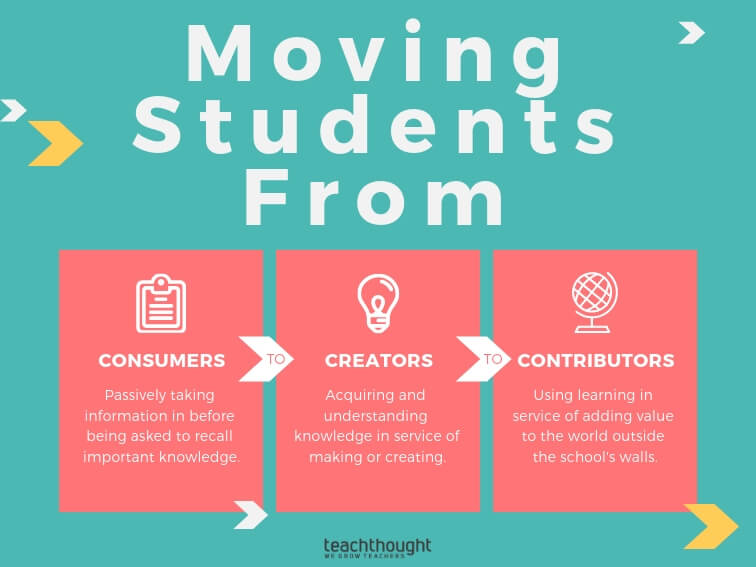
Moving Students From Consumers To Creators To Contributors
contributed by Drew Perkins
The oft-shared John Dewey quote “Education is not preparation for life; education is life itself.” is one that resonates with progressive educators around the world. Our education system however, seems to have missed all of those tweets and Pinterest pins.
In a recent podcast (listen below) with Getting Smart’s Emily Liebtag, I mentioned moving students from consumers to creators to contributors. Justin Tarte had said this in my TeachThought Podcast with him and I appreciated that language. It certainly is a great step to shift our teaching and learning from having students just consuming information to the top of Bloom’s taxonomy where they are creating. That next step, however, where their creations are at least potentially adding value to their community and perhaps the world at large is powerful.
While it’s true that our students are indeed the future, there are real reasons why we need to remember that they are also a big part of our today and our teaching and learning should reflect that.
One of my favorite projects of a teacher I’ve worked with as a facilitator of a PBL workshop is mentioned in the Getting Smart podcast above. Penn High School Science teacher Diane Bowersox empowered her students to help their community that was dealing with water quality concerns by organizing an event where people could get their water tested.
Penn High School students raised dawareness about the dangers of nitrogen in drinking water, used their learning of chemistry to help community better understand their water quality. While Diane was initially a little concerned about how many people would take advantage of this event it turned out her students tested water for 8 straight hours. As she notes in the news story, “I hope it leads them to feel like ‘hey, I can be involved in the community and make some kind of impact.” What a great example of student work contributing!
Education has the power to change communities but sadly our schools often play a marginalized role in their neighborhoods. While it’s certainly true that schools can and should grow students for their futures that doesn’t mean that they can’t also add value to the world while doing so.
Stephen Ritz has seized the opportunity to do just that where his students are transforming the food desert of the Bronx with the Green Bronx Machine. Watch the video to the right and you’ll feel his passion but you’ll also notice the blurring of the lines between school and the so-called “real-world” because his student’s creations are contributing to their neighborhood AND they are learning through the process.
Disconnecting our classrooms from the world outside of them is a missed opportunity that benefits both the school and student and the communities in which they live and serve.
Another great example of students contributing to their community is the work being done by the Leadership High School Network in Albuquerque, New Mexico. Years ago I had the chance to visit ACE Leadership High School and see first hand as students used their learning in the areas of architecture, construction, and engineering (ACE) to build and design for real clients in their area. After successfully launching that school they have since added Tech Leadership and Health Leadership schools in a similar model.
This network has benefitted from the consultation of a friend and colleague, Tim Kubik, whose upcoming book Unprepared for What We Learned: Six Action Research Exercises That Challenge the Ends We Imagine for Education builds upon the thinking he shared in the TEDx video to the left. In Tim’s talk he asks the question, “What if standards are the means to the end in mind, not the end in mind itself?”
There’s no doubt that rigid curriculum and tight adherence to standards and timelines are a friction point for more authentic and organic learning but it doesn’t have to be this way. Shifting our teaching and learning to focus on learning that is relevant to students doesn’t mean we can’t teach standards. Instead we’re looking for a shift in how they are incorporated into the learning.
There are more examples of moving students to be found, usually through project-based learning, as this shift gains momentum but is not nearly enough. As Tim mentions in his TEDx talk it’s time to think differently about instructional design in a way that focuses the learning students participating and contributing instead of doing work to show that “adults are getting it right.”
